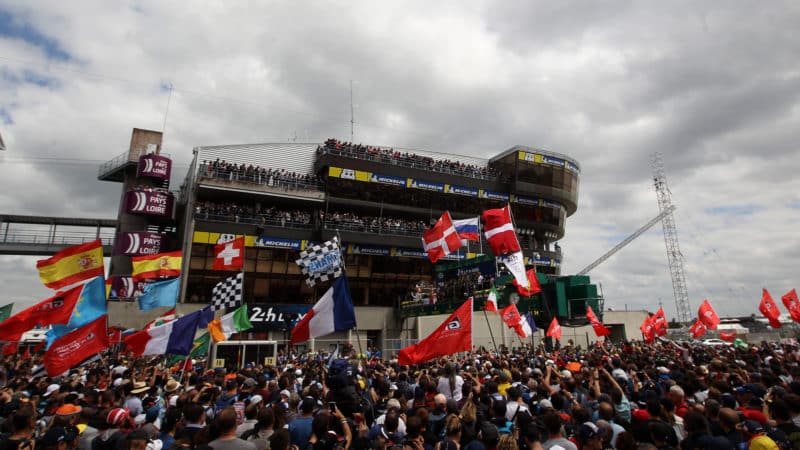Your ticket buys you four nights in your “room”, but as it measures only two metres by three I think ‘cubicle’ is probably a more accurate if less kind description. But cross channel passage is included as are entry tickets to the event. Prices are not cheap: £1150 per person based on two people sharing, so that’s £2300 for four nights in a very small temporary room some distance from the Le Mans village, with a £400 deposit payable (the ACO says £500 but we’ll give Travel Destinations the benefit of the doubt) upon booking and the balance due 12 weeks before the event, which I think is Thursday March 16. And you really don’t want to cancel. The deposit is non-refundable and if you cancel up to two weeks after March 16th you’ll lose 80% of the entire booking. Cancel from April onwards and they trouser the lot. The explanation for this is that the ACO “incur costs in cancelling your travel arrangements”. Hmm. So at the very least get insured and make sure it covers such eventualities.

ACO says it is looking for new campsites to meet demand
DPPI
So why is Le Mans 2023 proving so spectacularly popular this year? I think there are three factors in play.
First the 2022 race had one of the weakest entries in recent years. The two Toyotas were as dominant as predicted, claiming first and second in qualifying, took the lead at the start and, so far as I am aware, never lost it. Outside the top category there were just three manufacturers in GT Pro, compared to six just three years earlier, so the field was padded out with an enormous field of LMP2 and GT Am contenders. This came on the back of the 2021 event whose attendance was limited to 50,000 spectators (barely a fifth of the number that usually turns up) and 2020 whose attendance was limited to zero. In short for three years there has been massive, pent up demand for this race.
Second, the 2023 Le Mans is looking like it could be one of the greatest ever. With the new LMH and LMDh categories running together for the first time, works entries from Toyota, Porsche, Ferrari, BMW, Peugeot, Cadillac and returnees Alpine and Glickenhaus should, in theory, ensure raging competition at the front, across both classes whose rules have been configured to allow an equal chance of victory. We’ve not seen an entry like it at Le Mans for over 20 years.

Ferrari 499P is one of the cars making its debut in 2023
Ferrari
And finally, there is the centenary to consider. Le Mans is a town more steeped in motor racing history than any other save perhaps Indianapolis and Monte Carlo. The first ever grand prix was held there in 1906, indeed the winner’s reward for that race is where the term ‘Grand Prix’ originates, but it was held to the east of the city, not the south where the 24 hour circuit held its first race in 1923.
Plenty thought it entirely insane. When he heard one of his customers wanted to enter the race WO Bentley refused to have anything to do with it, proclaiming, ‘I think the whole thing’s crazy. Nobody’ll finish. Cars aren’t designed to stand that sort of strain for 24 hours.’ Happily he relented at the last minute, went to watch, ended up managing the pit and, like the rest of us, fell in love with the Le Mans 24 hours.
The race has been held every year since save 1936 when industrial action in France forced it to be cancelled and between 1940-48 when global conflict did the same.

The Chenard-Walckers of Léonard and Lagache leads the first Le Mans 24 Hours in 1923
Klemantaski Collection/Getty Images
So will the 2023 race turn out to be a classic? On paper it absolutely should, but there are two points to consider. First, Le Mans has a habit of defying the form book, and with new regulations it seems certainly possible and possibly likely that one team will have done its homework better than any other, with the LMH contenders being allowed far more design latitude than their LMDh rivals.
The second point is that even if it is shaping up nicely, there’s always the possibility the authorities will ruin it by trying to micro-manage the dreaded ‘BoP’ balance of performance. I’ve seen at least one team manager in tears when the fact his team had done a better job than anyone else in qualifying was penalised so heavily its chances in the race were ruined. And I’ve seen at least one other manufacturer appear completely off the pace in early races of the season only to receive a very favourable BoP and suddenly find a level of performance hitherto unimagined by anyone outside the team. Some suspected that the early races had been sacrificed in an attempt to secure the best possible terms for Le Mans, turning them into a pantomime and insulting the spectators who’d paid good money to see what they believed to be a proper motor race.
So the ingredients are there for sure, but the chefs – the ACO and FIA – still need to prepare and serve the dish. Personally I hope they just chuck them all in the pot and let what will be, be. The pressure to try and arrange a fairytale finish in the centenary year will be great and almost certain to blow up in their faces. It should be resisted.



